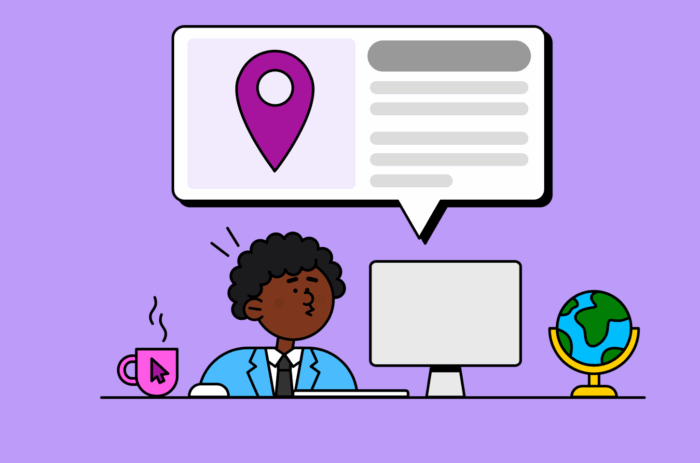- Local citations are important information sources for LLMs.
- Yelp is used as a source in a third of all searches, and often multiple times in one search.
- LLMs use reviews from Yelp, Google Business Profile, and other sources to get additional rich information.
- LLMs also take information from social media channels.
- Businesses own websites are incredibly important sources for LLMs.
- Industry niche directories are a regular source of information.
Thanks to AI, the world of online search is changing fast. With large language models (LLMs) like ChatGPT, Gemini, and Perplexity becoming more common, how businesses get found online is evolving. This shift is bringing a fresh focus to some local SEO basics that you might have been overlooking recently: citations and local listings.
Citations and local listings are back in the spotlight
There’s been a lot of talk about citations in the context of AI search. For traditional SEOs, citations mean unlinked brand mentions, i.e., your business being mentioned in a news article, blog post, or PR, but without a direct link back to your site. While these have always been part of a solid online presence, now these unlinked mentions, along with local citations and listings, are being seen as key for ranking in AI searches.
Obviously, for local SEOs, citations are something we’ve been using for years.
Citations in the form of local listings and aggregators used to be absolutely vital for local visibility. In recent years, they have become more of a foundational task. But with AI-driven search on the rise, they’re making a big comeback, often being referenced directly by these new AI platforms.
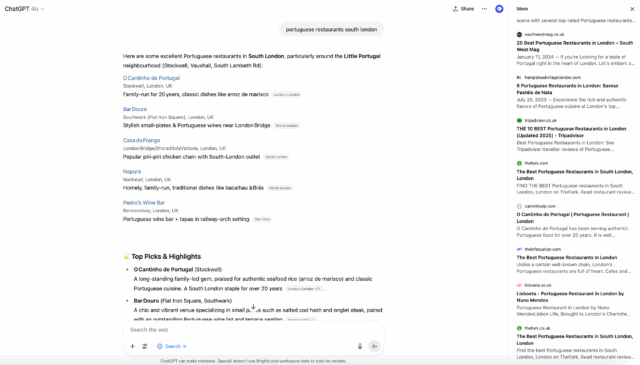
For example, Data Axle points out how crucial it is to get your locations synced with major voice assistants like Amazon Alexa, Google Assistant, and Apple Siri, and to ensure accuracy for GPS services like Uber. If your business doesn’t refresh and rebuild its listings and citations for this new AI-driven world, it’s definitely going to miss out.
Foursquare’s surprising role with ChatGPT
Here’s a real head-scratcher that shows just how important diverse local data sources are: the partnership between Foursquare and ChatGPT. A few months ago, Foursquare teamed up directly with ChatGPT, meaning Foursquare’s location data is now powering many of the AI’s responses.
What’s really wild about this is that Foursquare has pretty much retired its consumer-facing apps and websites. Yet, it’s now a key aggregator for AI search. It’s important to note that Foursquare isn’t necessarily appearing as a directly linked source in the way other citation or listing sites might. Instead, AI models are pulling information straight from their vast database. Reports suggest that a significant 60% and 70% of local results on ChatGPT come straight from Foursquare’s city guide listings, especially for smaller towns or niche businesses.
This really hammers home that listings beyond just Google Business Profile (GBP) and Yelp have real value. If ChatGPT doesn’t find enough info on Foursquare, then it turns to other sources, including Google Business Profile. With over 100 million points of interest in more than 200 countries, Foursquare’s database is a surprisingly powerful player in the AI search game.
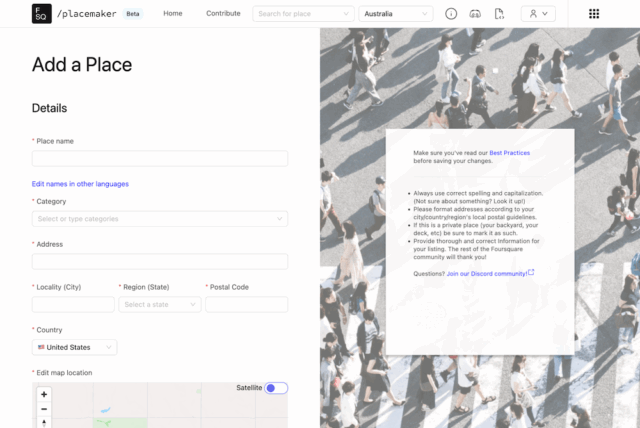
What we’re seeing in AI search: All LLMs are using directories for sources, and Yelp is prevalent
From what we’re observing across various AI search platforms, there’s a clear shift in how local business info is being pulled and presented. We did some real-world searching and found the following.
|
Methodology We performed 20 different searches across 10 different industry niches. Each search was repeated on Google AI Mode, Google Gemini, Perplexity AI, and ChatGPT Search to see where they got their local information. In each industry, we did:
We then collected the sources the AIs listed for each search, regardless of whether they were used in the final result. |
Directories are key for AI search
All LLMs are using directories and citations for business information across every industry.
- Platforms like MapQuest were frequently leveraged by both Google AI Mode and Perplexity, demonstrating that even long-standing directories remain highly influential in the AI ecosystem.
- For specialized sectors, AI models exhibit a strong preference for industry-specific directories.
- In our dentistry searches, for example, ChatGPT exclusively sourced information from ten different dental directories. Toprateddentist.com appeared as a key source for Gemini, AI Mode, and ChatGPT across these searches.
- Similarly, sites like Superlawyers.com and Findlaw.com were heavily relied upon by ChatGPT and Perplexity for legal-related queries. This emphasizes the need to be present and accurate within your specific industry’s leading directories.
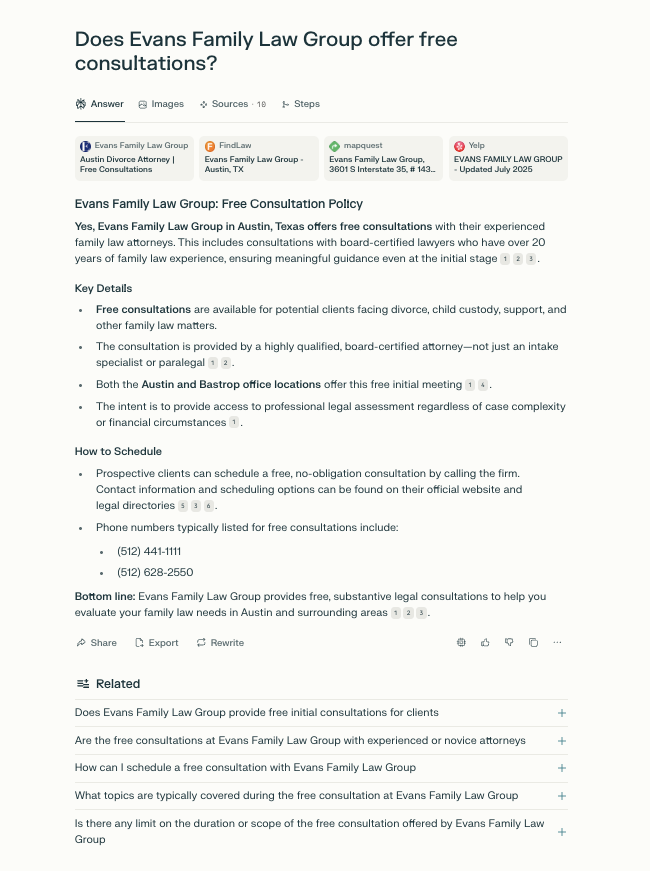
Yelp is a strong influence
Despite a fluctuating reputation among some users, Yelp remains an undeniable force in AI search:
- Yelp was used as a source in 33% of our overall searches. Perplexity notably used Yelp in every single industry we investigated, though not for every individual search within those industries.
- While Google Gemini was the only LLM that did not directly cite Yelp, Google AI Mode still pulled information from Yelp for multiple industries, including dental, hospitality, and fitness.
- LLMs utilized Yelp not only to extract specific business information but also, crucially, to surface and summarize customer reviews.
Google Business Profile is still essential for Google’s LLMs
Unsurprisingly, Google’s own AI models heavily favor Google Business Profile listings:
Even in instances where GBP wasn’t the main cited source, AI Mode would still display GBP information within its results. It often summarizes key details via text alongside data from other sources before presenting the full GBP listing further down. This highlights its importance for visibility within Google’s AI environment.
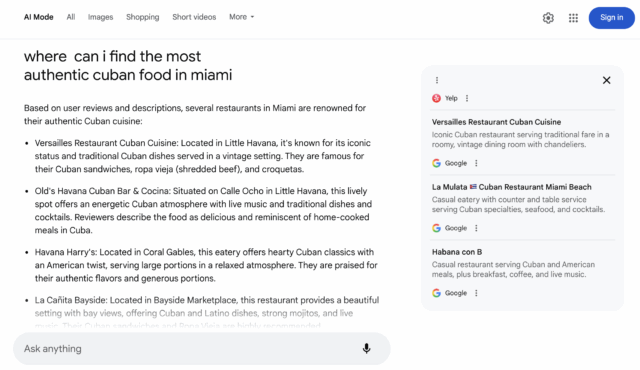
Your business website really matters
Perhaps the most reassuring finding for businesses is the continued importance of their own websites.
In our previous ChatGPT source study in December 2024, we found that ChatGPT used business websites as a source 58% of the time. This continues to be the case.
The vast majority of sources across every single LLM and industry were businesses’ own websites. This finding really highlights just how critical it is to have your own, well-maintained website. Your website serves as the ultimate authoritative source for LLMs seeking the most accurate and complete information.
Other notable findings
While directories and your website form the backbone, our research also points to other content types and platforms influencing AI search results:
- For industries like hospitality, blogs and lifestyle-oriented websites frequently appeared as sources, indicating the value of content marketing and partnerships beyond traditional listings.
- Social platforms are increasingly contributing to the AI search landscape.
- Instagram was cited as a source by both Google AI Mode and Perplexity.
- Facebook was used by Google AI Mode and ChatGPT.
- YouTube content influenced results for both Gemini and Perplexity.
This shows your business needs a complete online presence with accurate information, good review management, and engaging content on many different platforms to help AI find you easily.
What this means for your business
The rise of AI search is a game-changer for how your business needs to approach getting found online. To make sure your business stays in the running in this new era, here’s what you need to focus on in terms of citations and listings:
1. Build and optimize your foundational citations (including niche and key directories)
Our research clearly shows that directories are key for AI search. LLMs are extensively using them across every industry. This means actively working on getting your business mentioned across all sorts of online platforms, both broad and niche-specific.
Platforms like MapQuest were frequently cited, highlighting the continued importance of even long-standing directories. Also, for specialized sectors like dentistry (where Toprateddentist.com was a key source) or legal (with Superlawyers.com and Findlaw.com), AI models show a strong preference for industry-specific directories.
Our Citation Builder service can streamline this process. Our team of experts finds and builds high-quality citations on relevant directories for you. You can also use our Citation Tracker tool to keep an eye on your existing citations, helping you spot inconsistencies or new opportunities that can boost your online authority.
2. Prioritize Google Business Profile
Google AI Mode consistently relied on GBP as a primary information source, often summarizing its details even when other sources were also used. This highlights that a complete, accurate, and optimized GBP is non-negotiable for visibility within Google’s AI environment.
3. Optimize your website
Our findings show that your business’s own website is often the dominant source for LLMs. This means your website is truly your most important online asset. Ensure it’s up-to-date with essential information, including your Name, Address, and Phone number (NAP), detailed services offered, current opening hours, compelling photos, answers to FAQs, customer reviews (and links to review platforms), and comprehensive business descriptions.
4. Leverage data aggregators
Platforms like Data Axle, Foursquare, Neustar, and others are crucial for making sure your business info gets shared across AI search engines, voice assistants, and navigation systems. These aggregators push your core data out widely, ensuring LLMs have access to consistent information.
As part of our Citation Builder service, we offer direct submissions to the five major Data Aggregator Networks (including Data Axle, Foursquare, and Neustar). This ensures your core business information is pushed out to thousands of directories, apps, and mapping services, widening your reach to where AI models get their data.
5. Stay on top of your listings management
Our research, particularly on Yelp, demonstrates the strong influence of review platforms. Yelp was a source in a significant 33% of our searches, used not just for business info but crucially, to summarize customer reviews. This underscores the need to make absolutely sure your business name, address, and phone number (NAP) are identical across all your online listings, your website, Google Business Profile, Foursquare, Apple Maps, and social media.
Keep all your profiles complete, accurate, and up-to-date with details like categories, hours, and photos. And don’t forget to actively manage customer reviews; they play a big part in how AI pulls together information and ranks businesses. Also, using strategic keywords in your listings can help improve their performance in local searches.
Our Active Sync tool ensures your most important business information is consistent and accurate across major platforms like Google, Facebook, Apple Maps, and Bing. It helps prevent unwanted edits and quickly pushes out updates.
With our Reputation Manager tool, you can monitor reviews across 80+ sites, get notified of new feedback, and even generate more positive reviews, all helping to build the strong online presence AI algorithms are looking for.
6. Cultivate local mentions and PR
Beyond directories and your website, our findings show that other content types and platforms are influencing AI search. For instance, content and lifestyle sites were sources for hospitality queries, with reputable lifestyle publications like Time Out and smaller, more location—or industry-specific blogs.
Social media platforms like Instagram, Facebook, and YouTube were also cited by various LLMs.
Cultivating local mentions and securing links from local news sites, community blogs, and other authoritative online sources is increasingly important. Our research into AI sources shows that these types of online local mentions are key signals in the eyes of AI algorithms. So, investing time in local public relations and actively seeking out these non-directory mentions will play a crucial role in your success.
AI search isn’t something that’s coming; it’s here now. Adapting your local SEO strategies to fit this new AI landscape will put you in the best position to get seen by customers, no matter where they’re looking.
